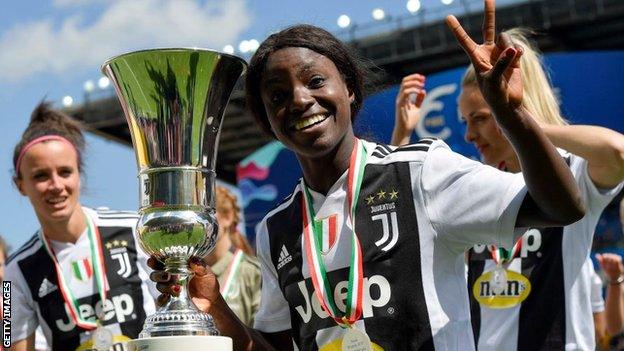Eniola Aluko says targets needed to increase BAME inclusion at top level of sport
- Published

Eniola Aluko won the Women's Coppa Italia with Juventus in 2019
Ex-England forward Eniola Aluko says targets are needed to increase black, Asian and minority ethnic (BAME) inclusion at the top level of UK Sport.
Recent data shows, external that of all national sporting governing body board members, 3% are black.
Aluko, Aston Villa Women's sporting director, suggested a 30% BAME representation target to the Digital, Culture, Media and Sport Committee.
"There has to be something intentional about change," she said.
"When you rely on self-regulation, people tend to fall back into a comfort zone and what they've always done.
"I think we need a target, 30% is a good one. Whether owners or directors like it or not, this is what the game needs to do."
Aluko added: "There's a lot of recycling of the same people in the game and if you do something like a target or a quota, you will start to see recruitment behaviour change."
Last week Chris Grant - one of the most senior black administrators in British sport - said there is a "change in the tide" of racism in the UK's sporting system.
Former Birmingham City, Chelsea and Juventus player Aluko retired from playing in January, before being named Villa Women's first sporting director.
She is England's joint-10th most capped international, scoring 33 goals in 102 senior appearances.
"I think there has certainly been a lot of progress from when I started playing football 20-plus years ago. There was absolutely no-one I could look to in the game that looked like me, either as a woman or a black woman," she told the DCMS committee on Tuesday.
"Fast forward 20 years we are still seeing a glass ceiling to a certain extent."
Aluko, 32, was found to have been subject to racial discrimination by then England women's manager Mark Sampson following an independent investigation in 2017.
The Football Association subsequently apologised to Aluko, who had said the body was "dismissive" when she first claimed Sampson made racist remarks towards her in 2014.
Speaking to the DCMS committee, she said she hoped the approach would be different today.
"I genuinely would like to believe that if a similar thing happened to another black player in the team today, it would be dealt with much differently," she said.
"First of all that it wouldn't happen but I think it would be dealt with much differently and much more independently and without conflict."